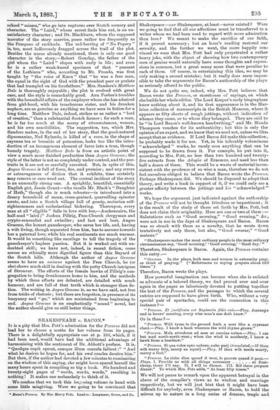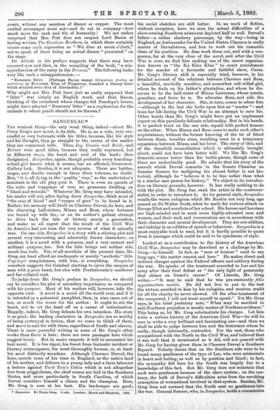SHAKESPEARE v. BACON.*
IT is a pity that Mrs. Pott's admiration for the Promus did not lead her to choose a motto for her volume from its pages. There is a delightfully appropriate one at p. 183, which, if it had been used, would have had the additional advantage of harmonising with the sentiment of Dr. Abbott's preface. It is, " Quodque cupit sperat, sufflque ilium orabula fallout :" "And what he desires he hopes for, and his own* oracles deceive him." But then, if the author had devoted a few minutes to ruminating on the wisdom of this saying, she might have spared herself the many hours spent in compiling so big a book. Six hundred and twenty-eight pages of " words, words, words," resulting in nothing ! It makes one melancholy to think of it
We confess that we took this imposing volume in hand with some little misgiving. Were we going to be convinced that
• Bacon's Promus. By Mrs. Henry Putt. London : Longman, Green, and Co.
Shakespeare—our Shakespeare, at least—never existed P Were we going to find that all our affections must be transferred to a writer whom we had been used to regard with more admiration than love? We meant to make the sacrifice of our faith, if it proved necessary ; but an hour's reading restored our serenity, and the further we went, the more happily con- vinced we were that Mrs. Pott had only perpetrated a rather heavy joke, with the object of showing how two contemporary men of genius would naturally have some thoughts and expres- sions in common, but a great many more that were peculiar to. each of them. Of course, in entertaining this idea, we may be only making a second mistake ; but it really does seem impoti- sible to take the arguments for Bacon's authorship of the plays as seriously offered to the public.
We do not quite see, indeed, why Mrs. Pott believes that Bacon wrote the Premix, or storehouse of sayings, on which she builds her whole edifice. The Lord Keeper's early biographers knew nothing about it, and its first appearance is in the Har- leian collection of manuscripts in the British Museum, where it appears as fifty sheets of rough jottings, without indication of whence they came, or to whom they belonged. They are said to' be "in Lord Bacon's well-known handwriting," and Mr. Meade Thompson vouches for its authenticity ; bat this is only the opinion of an expert, and we know that we need not, unless we like, accept that as evidence. If Lord Bacon did make this collection, he probably made it for nee. Yet, in his tolerably voluminous.
" acknowledged " works, he rarely uses anything that can be supposed to be drawn from it. For example, he put into it, according to Mrs. Pott, no less than two hundred and twenty- five extracts from the Adagia of Erasmus, and used less than half a dozen of them. This would be a waste of material incon- sistent with the prudence of so wise a man, therefore we do not feel ourselves obliged to believe that Bacon wrote the Promus. Perhaps Shakespeare did. We should be disposed to adopt that theory, and write a book in support of it, if we could only see a greater affinity between the jottings and his " acknowledged' works.
We hope the argument just indicated against the authorship. of the Promus will not be thought frivolous or impertinent ; it is the result of the study of those set forth by Mrs. Pott, but does not claim their originality. Here are one or two of them :- Salutations such as " Good morning," " Good evening," &c., were not in use in the days of Shakespeare and Bacon. Bacon, was so struck with them as a novelty, that he wrote down tentatively not only these, but also, " Good swoear," " Good matens."
" Shakespeare makes the most ordinary people in the most ordinary circumstances say, Good morning,' Good evening,' Good day."
Therefore, Shakespeare is Bacon. Again, the Promus contains this entry :—
" Oremus. In the plays, both men and women in extremity pray, or think of praying." (" References to saying prayers about 150, times.")
Therefore, Bacon wrote the plays.
How powerful imagination can become when she is enlisted as advocate of a beloved theory, we find proved over and over again in the pages so laboriously devoted to putting together the text of the Proms, and the passages to which the several entries are supposed to have given birth. Who, without a very special pair of spectacles, could see the connection in this instance P-
" Proms. Et justifieata est Sapientia fcliie suis.—Play. Journeys end in lovers' meeting, every wise man's son doth know."
Or in these ?-
"Promus. Wild tyme in the ground hath a sent like a cypresse chest.—Play. I know a bank whereon the wild thyme grows."
"Proms. Mala attrahens ad sese ut caecias nnbeo.—Play. I au but mad north-north-west ; when the wind is southerly, I know a hawk from a handsaw."
"Promus. Si qua voles apte nubere, nubs parj (translated,—If thou wilt marry fitly, marry an equal).—Bay. If thou wilt needs marry, marry a fool."
"Proms. Le riche dine %nand it vent, le pauvre quand it pent.— Plays. I. Provide us with all things necessary at East. cheap, there I'll sup. II. I will to dinner. III. Bid them prepare dinner." To which Mrs. Pott adds, " At least fifty times."
We will not pause to remark upon the apparent betrayal in the above of the compiler's views as to wisdom and marriage respectively, but we will just hint that it might have been difficult for anybody, even Shakespeare or Bacon, to hold the mirror. up to nature in a long series of dramas, tragic and
,comic, without any mention of dinner or supper. The most ,exalted personages must eat—and do eat in company—how much more the rank and file of humanity ! We are rather surprised that Mrs. Pott does not suspect Lord Bacon of having written The Corsican Brothers, in which there certainly occurs some such expression as " We dine at seven o'clock," not to speak of there being an actual dinner " presented " on the stage.
Dr. Abbott in his preface suggests that there may have occurred now and then, in the compiling of the book, " a mis- apprehension of the entry in the Prams." The following looks very like such a misapprehension : — " Enmenes litter. (Perhaps Bacon meant litteratum fautor, or patronus, as Eumenes, King of Pergamus, founded a library there which rivalled even that of Alexandria.)" Why might not Mrs. Pott have just as easily supposed that -‘1 litter " was simply an English word, and that Bacon, thinking of the swineherd whose charges fed Penelope's lovers, might have adopted " Eumenes' litter " as a euphemism for the animals to whom pearls should not be thrown P



































 Previous page
Previous page